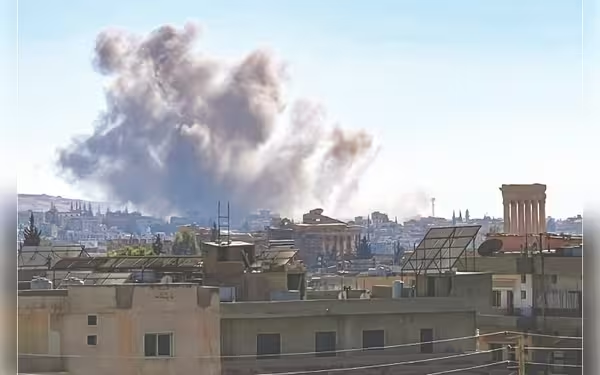Saturday, November 16, 2024 09:41 PM
Israel Bombs Lebanon Following Hezbollah's Attack on Mossad
- Israeli airstrikes kill 51, injure 223 in Lebanon.
- Hezbollah claims missile strike on Mossad headquarters.
- UN reports 90,000 displaced amid escalating violence.
 Image Credits: dawn
Image Credits: dawnIsrael intensifies airstrikes in Lebanon after Hezbollah's missile attack on Mossad, causing significant casualties and displacement.
In recent days, the conflict between Israel and Hezbollah has escalated dramatically, with Israel launching extensive airstrikes across Lebanon. This surge in violence comes in the wake of a missile attack claimed by Hezbollah, targeting the Mossad headquarters near Tel Aviv. The situation has led to significant casualties and displacement, raising concerns about the humanitarian impact on civilians caught in the crossfire.
On Wednesday, Israeli airstrikes resulted in the deaths of 51 individuals and left 223 others injured, according to the Lebanese health minister, Firass Abiad. The strikes have intensified since Monday, marking one of the deadliest periods in Lebanon since the end of its civil war in 1990. The International Organization for Migration has reported that nearly 100,000 people have been displaced due to the ongoing violence, highlighting the dire humanitarian crisis unfolding in the region.
Hezbollah, in a bold statement, claimed responsibility for launching a Qader 1 ballistic missile at the Mossad headquarters, asserting that this action was in support of the Palestinian people in Gaza. The group accused the Israeli intelligence agency of orchestrating attacks that resulted in the deaths of Hezbollah members, further fueling the cycle of retaliation. The missile attack triggered alarms in Tel Aviv, indicating the heightened tensions and the potential for further escalation.
As the conflict continues, the United States has expressed concern over the missile attack, yet remains hopeful for a diplomatic resolution to the violence. Meanwhile, Israel has expanded its military operations, targeting various locations across Lebanon, including the beach resort town of Jiyyeh and several areas in southern Lebanon. The ongoing exchanges of fire along the Israel-Lebanon border have been a direct consequence of the war that erupted last October between Israel and Hamas, with Hezbollah asserting its solidarity with Hamas.
The humanitarian situation is becoming increasingly critical, with hospitals overwhelmed by the influx of wounded individuals. The United Nations has reported that approximately 90,000 people have been displaced in just this week alone, as the conflict shows no signs of abating. Human Rights Watch has called for an international investigation into the hostilities, emphasizing the need to protect civilians caught in the conflict.
In light of these developments, the Foreign Office of Pakistan has issued a travel advisory, urging its citizens to avoid traveling to Lebanon and advising those already in the country to seek safe areas or leave if possible. This advisory underscores the seriousness of the situation and the potential risks faced by foreign nationals in the region.
As the situation unfolds, it is crucial for the international community to pay attention to the humanitarian implications of this conflict. The ongoing violence not only affects those directly involved but also has far-reaching consequences for regional stability and global peace. The hope remains that diplomatic efforts can pave the way for a resolution, allowing the affected populations to rebuild their lives in safety and security.













